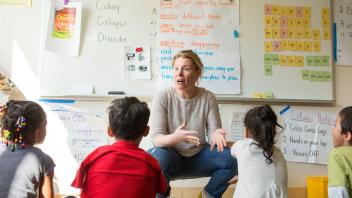Spoiler alert: This blog entry is a two-parter. The first part (today’s entry) describes a problem to which the second entry will offer some nifty practical solutions (nope, no practical solutions today).
An idea heavily promoted in Common Core (CCSS) discussions is the notion that we shouldn’t talk about students’ “prior knowledge,” and that avoiding such discussions somehow “levels the playing field” when it comes to learning to read. Researchers in the cognitive sciences rediscovered the importance of people’s knowledge in learning and comprehension back in the 1970s (revisiting ideas previously explored by Bartlett, Kant, Plato, etc.).
Research findings were very clear: readers comprehend more when a text overlaps with their knowledge of the world and they comprehend less when there is less such information in their minds. Research also has shown benefits from increasing students’ prior knowledge (it is “prior” in the sense that reader’s knew it before the author told them). And even reminding students that they have relevant knowledge prior to reading can bear fruit.
Why is prior knowledge so useful to readers? There are many reasons, but certainly a basic one is that the availability of such information reduces how painstaking reading may have to be. If you already know much of what the author is going to say, you can kind of go on autopilot just watching for the new stuff. Your less informed classmates are going to have to attend to the text more carefully, trying to build up all of this information in their heads, proposition by proposition. Let’s face it, if you have to figure out and remember 100 facts from a text and I only need to learn 50 facts from it (since I already had the other 50), then I’m going to look like I comprehended more.
Another reason prior knowledge helps is that no author ever fully explains anything. There are always inferences that need to be drawn and connections that have to be made. Sometimes readers have to sort out an ambiguity in the text’s wording, and so on. All of those challenges are easier to deal with from a basis of knowledge.
And prior knowledge affects memory matters, too. If I already have a lot of information in my memory about the ideas presented in this text, then storing the new information within those already created structures gets easier, too. (There’s a reason that P. David Pearson has long defined reading comprehension as “connecting the new with the known.”)
However, there are costs to prior knowledge as well. Research has shown that readers will sometimes allow their current beliefs to overwhelm the author’s message. Thus, readers thinking they understand how the physical world works (based on their perceptions of their experiences with processes like gravity), will disregard the author’s explanation of what scientists have figured out in favor of staying with their prior (though incorrect) “knowledge.” Of course, in most reading prior knowledge doesn’t make us miss the author’s message altogether, but it may lead us to read less carefully (since we assume that we already know it, we don’t need to put in the effort and, thus, miss the nuance). Reading less reflectively or thoughtfully, weighing the author’s words to a lesser degree, and so on, can’t be good.
Based on such research findings, school reading programs have gone off the deep end with prior knowledge discussions (maybe you have seen the ads for “Basals Gone Wild” videos on late night cable). Such activities had already been long in evidence — at least since the birth of the “teacher’s guide” in basal readers — but since 1975 the “Background” activities seem to have exploded. That means if kids are to read a story about a family vacation, there will need to be an extended discussion of family vacations prior to any reading. Of course, everybody has to be able to tell about their vacations and, perhaps, for the kids who haven’t had one, the teacher can have them talk about where they would like to go (we could call that pretend prior knowledge, I guess). Apparently, there is no school text that wouldn’t benefit from a 15-minute discussion of prior knowledge before reading.
Enter Common Core (the plot thickens). CCSS emphasizes “close reading” and a key idea of close reading is to interpret what is in the text rather than examining one’s presuppositions, the author’s biography, or other sources of information external to the text. Some CCSS proponents have gone so far as to claim that not discussing prior knowledge or asking questions about what children already know will somehow level the playing field when it comes to reading comprehension. Their hope is that the poor kids and the rich kids will then be held accountable for the same work — making sense of the information that they all had equal access to in the text itself.
That sounds great, but it ignores a basic fact about reading: Prior knowledge plays a role in text interpretation whether there is a background discussion or not. We can make it look like the playing field has been evened by not talking about prior knowledge, but the more advantaged kids will then just appear to be smarter and better when it comes to reading (since all or most of the advantages of having prior knowledge will still be there).
Funny thing is that I agree with those critics who think we’ve gone off the deep end when it comes to prior knowledge in reading. The discussions go on too long. The questions about it aren’t thoughtful or strategic. Frankly, our instructional practices don’t seem especially consistent with the research studies. In other words, we have taken a valuable set of insights and turned them into a dogmatic and inflexible set of practices that accomplish very little.
What role should prior knowledge play in classroom reading discussions and how should teachers handle prior knowledge in the classroom? For some brilliant (yeah, right) answers to these provocative questions, tune in next time.
_________________________________________________
To learn more about teaching and assessing reading, writing and literacy, visit Dr. Shanahan’s blog .

